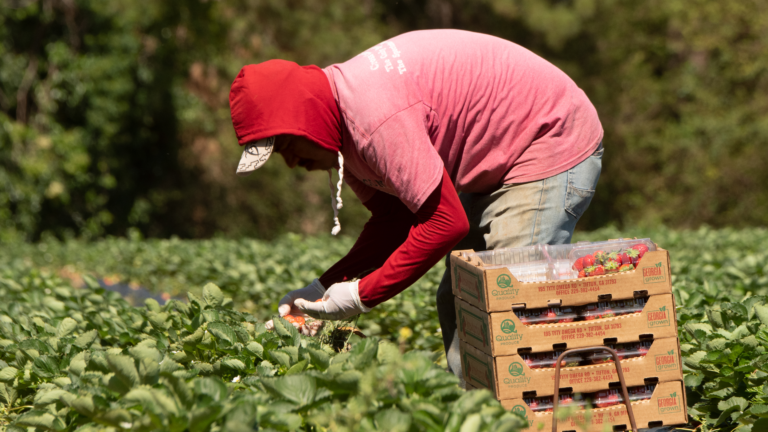The Midwest saw a record rise in the number of agricultural guest workers this year helping out on farms, in meatpacking plants and with landscaping companies.
That jump fits with a national trend. The Department of Labor says the U.S. let in a record number of H-2A visa workers this year.
Illinois, Iowa, Indiana, Kansas and Oklahoma all saw record numbers of agricultural guest workers this year. American farmers have increasingly relied on foreign guest laborers over the past few years because it’s become harder to hire domestic workers.
Alexandra Sossa, the executive director of the Farmworker & Landscaper Advocacy Project (FLAP) in Illinois, says the Trump administration deterred many farmworkers from coming to work here the past few years.
“When you start telling people that, ‘You are undocumented. We don’t care about you. You don’t have any rights. You are Hispanic. You don’t count,’ then people are like, ‘OK, then, I’ll stay here, I don’t have anything to do there,’” she says.
She says workers were less worried about travelling internationally this year now that the world is almost two years into the COVID-19 pandemic and vaccines are widely available.
If that trend continues, she says, more guest workers could stream into the Midwest next year.
“It’s not that the pandemic is going to be gone,” she says. “But at least we have the vaccination. We have other options and people will not be afraid to travel.”
Overall, the U.S. approved 317,619 H-2A visas this year. That’s a 15% increase from last year. Indiana, Iowa and Illinois are among the top H-2A employers in the Midwest. All three states saw all-time high numbers of guest workers this year at 4,461, 4,030 and 3,010, respectively. That’s according to data from the Department of Labor compiled by Farmworker Justice.
The rise in H-2A visa workers comes at a time when employers complain that the program is overly burdensome and expensive.
“It’s a pain. I hate it. I wish I didn’t have to use it,” says Jeff Flamm, owner of Flamm Orchards in southern Illinois and one of the top employers of H-2A visa workers in Illinois. “It’s cumbersome, it’s expensive, it’s horrible.”
Flamm supports the 2021 Farm Workforce Modernization Act, which would streamline the H-2A visa program and provide a path to citizenship for undocumented workers. The legislation is currently languishing in Congress.
Sossa says employers like Flamm would be hard pressed to find labor locally.
“It’s hard to find workers here, who are already in the United States, willing to do the work,” she says. “The work is not easy.”
She says the living and working conditions can be unbearable. Workers are often paid below minimum wage, don’t earn overtime despite working long hours and are prone to wage theft from employers. Speaking up about any abuses could cause them to lose the jobs that she says they often rely on to support families in their home countries. Losing those jobs can also subject them to deportation.
Just because the U.S. government is accepting more H-2A visa workers, Sossa says “it doesn’t mean that the exploitation is not going to be there. It doesn’t mean that their working conditions are improving.”
Follow Dana on Twitter @DanaHCronin
Harvest Public Media reports on food systems, agriculture and rural issues through a collaborative network of NPR stations throughout the Midwest and Plains.
9(MDM5MjE5NTg1MDE1Mjk1MTM5NjlkMzI1ZQ000))

